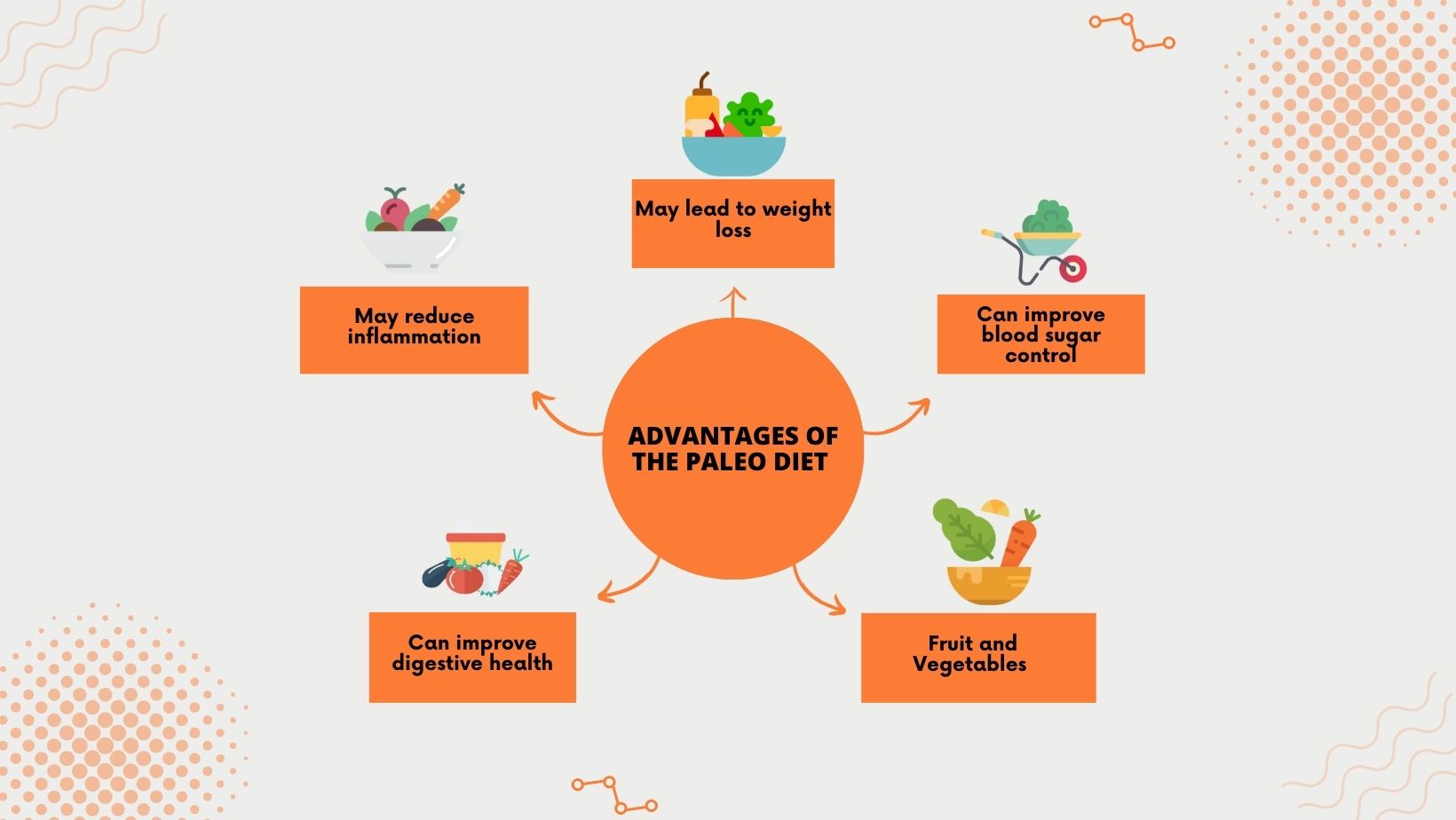
The Paleo Diet is a lifestyle and nutritional approach that focuses on eating whole, unprocessed foods. It emphasizes lean meats, fish and seafood, fruits and vegetables, nuts and seeds, healthy fats and oils, and excludes dairy, grains, legumes, refined sugars, and processed foods.
It is based on the idea that humans should eat the same foods our hunter-gatherer ancestors ate, as this is what our bodies are best adapted to digest and absorb, resulting in optimal health and weight maintenance.
The assumptions beyond eating paleo are current western diet causes health issues such as obesity, chronic disease risk, inflammation, etc.
On the other hand, It helps deal with inflammation, enhances your endurance, offers energy, and stabilizes blood sugar levels.
However, some scientists indicate it is a harmful diet because of the lack of dairy and grains. At the same time, these foods are healthy as they are a convenient source of fiber, vitamins, and minerals.
A Paleo diet has many health and fitness-related benefits, except those mentioned above.
Paleo Diet Rules
No rocket science is involved in understanding a paleo diet’s rules. It’s simple to consume food mentioned in the Paleo diet list and avoid unhealthy food.
However, there are several foods that you can eat sometimes.
Foods You Can Eat
Here are the food items one can eat while following a Paleo diet plan
- Chicken
- Meat
- Eggs
- Pork
- Salmon
Fruit and Vegetables
- Berries
- Apples
- Cabbage
- Cauliflower
- Melons
- Grapes
- Peaches
- Spinach
- Sweet Potatoes
Healthy Oils
- Almond
- Cashew
- Pecans
- Pine Nuts
- Pumpkin Seeds
Foods You Should Avoid
- Cereal grains
- Legumes (peanuts, beans, lentils, tofu)
- Salt
- Artificial sweeteners
- Refined sugar
- Processed foods
- Soda & sweetened beverages
- Refined vegetable oils
Above is the list of all the foods one needs to follow and avoid to gain optimal health. You may wonder who is eligible for such a diet plan. Don’t worry. We have got you covered; below, you can find the information.
Advantages of the Paleo Diet
It is a dietary approach that emphasizes consuming foods available to our ancestors during the Paleolithic era.
Here are some potential advantages of the Paleo diet:
May Lead to Weight Loss:
The Paleo diet encourages consuming whole, unprocessed foods such as lean protein, fruits, vegetables, nuts, and seeds.
These foods are nutrient-dense and typically lower in calories, which can lead to weight loss.
Can Improve Blood Sugar Control:
It excludes processed and refined carbohydrates that can cause blood sugar spikes and crashes. This can improve blood sugar control, especially for people with type 2 diabetes.
May Reduce Inflammation:
It emphasizes consuming whole, unprocessed foods naturally low in inflammatory compounds. This may help reduce inflammation in the body, which is linked to various chronic diseases.
Can Improve Digestive Health:
It encourages the consumption of fiber-rich fruits, vegetables, and nuts, which can support digestive health and reduce the risk of constipation and other digestive issues.

Conclusion
The Paleo diet plan brings rewarding health advantages, including organic foods like fruits, vegetables, and other processed items.
While following such a diet plan, you may experience an overall improvement in your health. However, make sure that you are buying fresh items from the market.
FAQs
Can a Paleo Diet Lead to Weight Loss?
Yes, a Paleo diet can lead to weight loss for many people, although individual results may vary.
It is based on eating foods available to our ancient ancestors, such as meat, fish, vegetables, fruits, nuts, and seeds, and avoiding processed foods, grains, and dairy products.
One of the key reasons the Paleo diet can lead to weight loss is that it emphasizes whole, nutrient-dense foods that are often lower in calories than processed foods.
Many people naturally eat fewer calories on a Paleo diet, which can lead to weight loss.
Additionally, the Paleo diet typically eliminates or severely limits grains, a significant carbohydrate source in many people’s diets.
Is the Paleo Diet a Healthy Eating Plan?
The paleo diet, also known as the Paleolithic diet or caveman diet, is a dietary plan based on the idea of consuming foods that were available to humans during the Paleolithic era.
This means eating whole, unprocessed foods like lean meats, fish, vegetables, fruits, nuts, and seeds while avoiding grains, legumes, dairy, and processed foods.
While the paleo diet has some potential benefits, such as promoting weight loss, improving blood sugar control, and reducing inflammation, it also has some drawbacks.